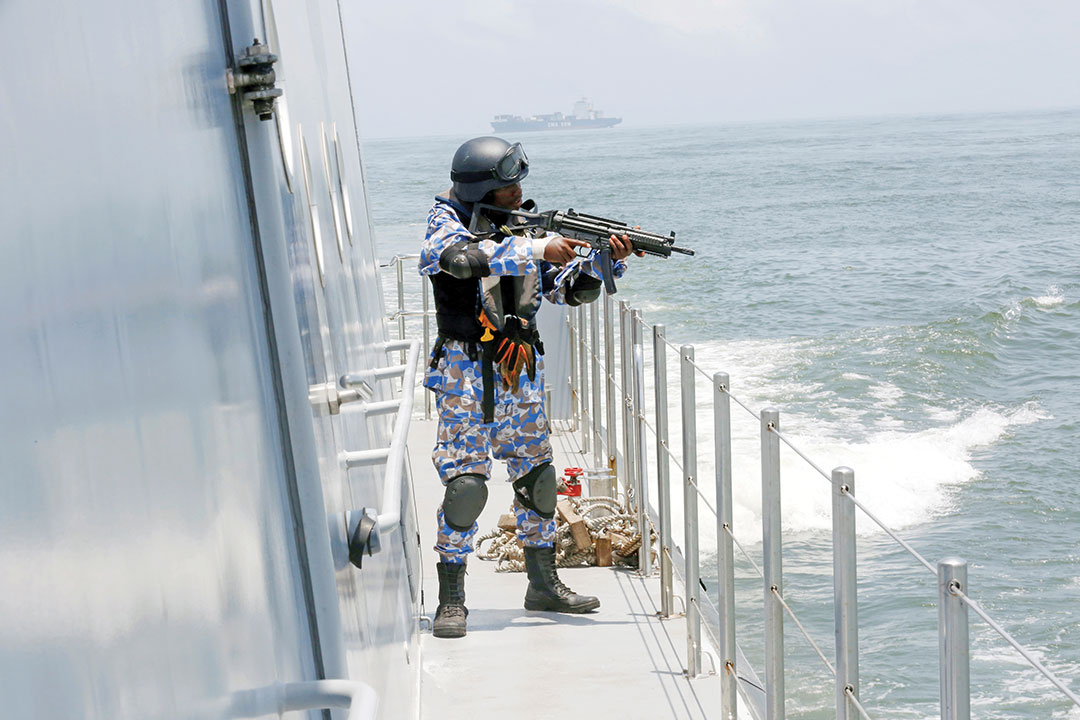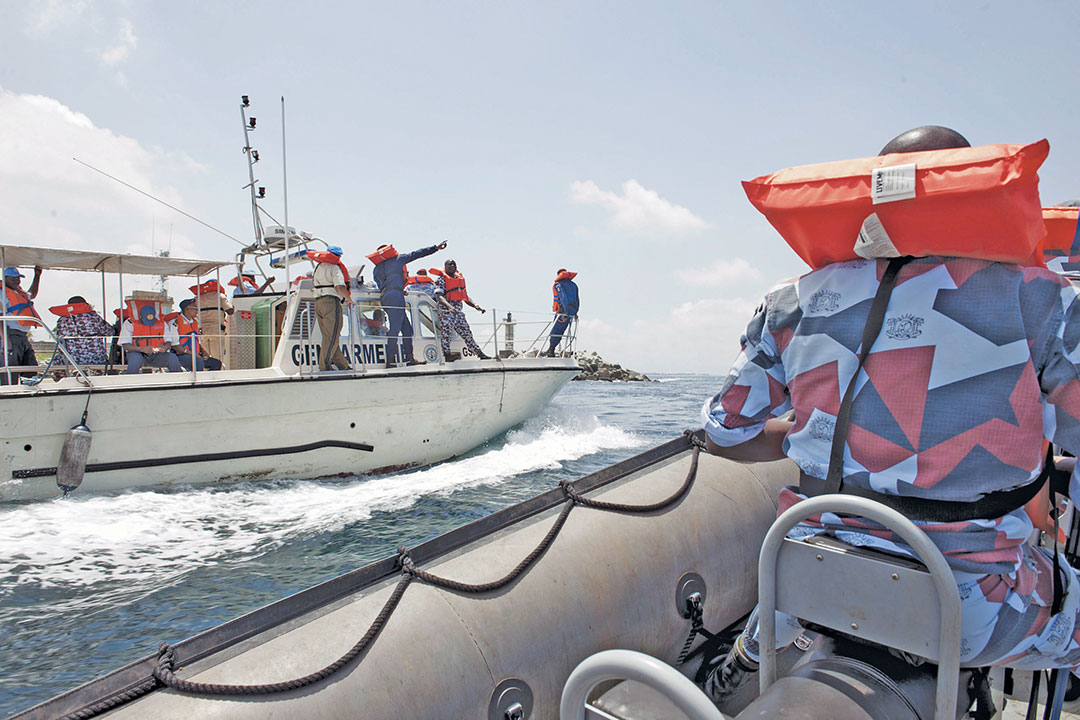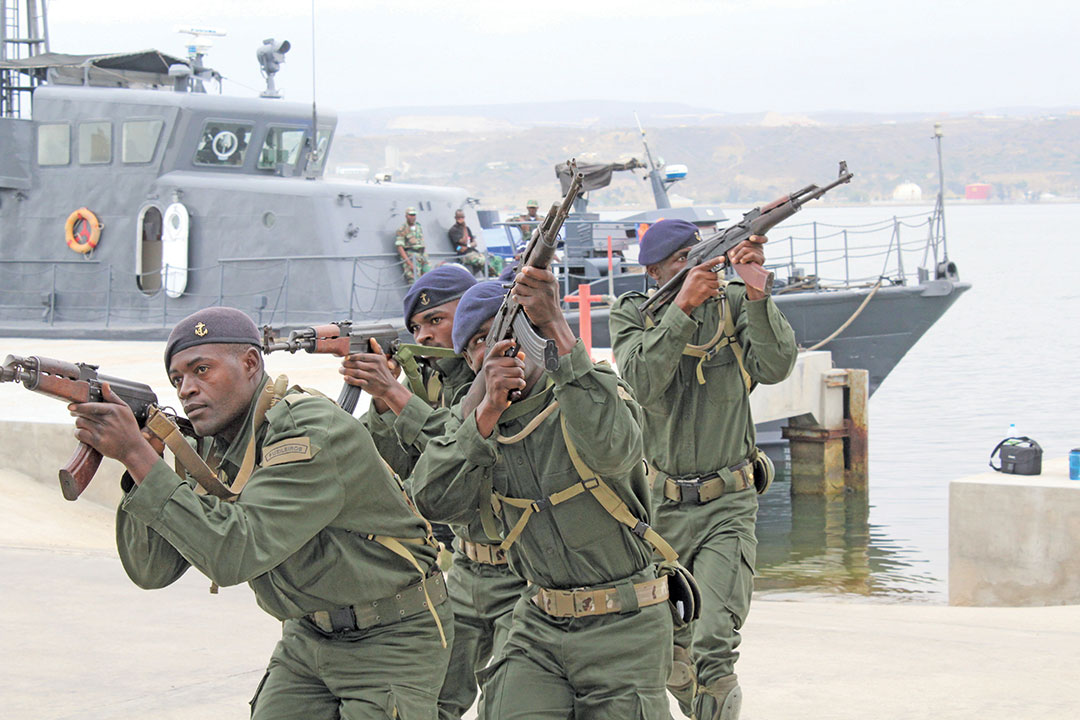Security at Sea Must Consider an Array of Issues, From the Environment to Economics
ADF STAFF
There was a time when a country’s maritime strategy consisted of its navy or coast guard protecting its waters, defending citizens from enemies and pirates, and going after people fishing illegally.
That’s a shallow view of maritime security in the 21st century. Groups such as the United Nations and the African Union say that a modern-day maritime strategy must protect assets, ensure sustainable economic growth, guard the environment, manage energy use, and build the ability to work with neighboring countries and regions.
Africa’s nations historically have been slow to protect and regulate their coasts. As they gained independence in the 20th century, the new nations had to have armies to preserve their sometimes-arbitrary borders, prevent and suppress rebellions, and protect citizens. Navies were not an economic priority.

“Coastal, island or archipelagic states around the world face varying degrees of challenges in securing their maritime territories,” according to the Africa Center for Strategic Studies’ (ACSS) 2016 report on maritime strategies. “Similarly, most of these states have yet to fully realize the development potential associated with exploiting the maritime domain in a sustainable fashion. These two pursuits — security and development — are at the heart of why states and international organizations around the world are constantly developing, implementing, assessing and revising maritime strategies.”
ECOWAS DOMAIN
The Gulf of Guinea offers a good case study. From Senegal in the north to Angola in the south, the Gulf of Guinea’s coastline stretches more than 6,000 kilometers. The countries have an estimated 24 billion barrels of crude oil reserves — 5 percent of the world’s total. The region has vast stores of natural gas, valuable minerals and rainforests. The 4,700-kilometer Congo River is the second-most-powerful river in the world after the Amazon, and it is the main commercial artery for equatorial Africa. The Gulf’s impact on trade far exceeds its geographical boundaries.
But like the rest of the continent, it faces many threats. Africa’s coast is threatened by piracy, kidnapping, robbery, oil bunkering, illegal fishing and all kinds of smuggling, including drugs, weapons and people. Parts of the coast are plagued with widespread pollution. In 1975, Gulf of Guinea nations organized the Economic Community of West African States (ECOWAS) to achieve “collective self-sufficiency” for member states by creating a single trade bloc. ECOWAS also serves as a peacekeeping force and in recent years has focused on its role in policing the Gulf. The group’s maritime domain consists of 11 of the 15 member states. In working on a regional maritime strategy, the organization has long concluded that “all of ECOWAS is affected by or dependent upon the maritime domain.”
“Our economies are unfortunately tied to the prospects of the ocean,” said Dr. Dakuku Peterside of the Nigerian Maritime Administration and Safety Agency. “The ocean is the medium for which most of our trade and trans-actions are conducted, the ocean also provides a unique opportunity for us to optimize the benefits of the blue economy and a special opportunity for us to tap into the benefits of nature,” he added, as reported by The Guardian of Nigeria.

In 2008, ECOWAS adopted ECOWAS Vision 2020, which laid out the strategic objectives for “a borderless region, sustainable development, peace and good governance, and integration into the global market.” The African Union has followed suit, concluding the negotiations on its 2050 Africa’s Integrated Maritime Strategy in 2014, following up with a Charter on Maritime Security, Safety and Development in 2016.
ECOWAS has drafted its Integrated Maritime Strategy based on four principles:
- The maritime domain is critical for economic development and affects coastal and noncoastal member states.
- Maritime challenges are transnational, trans-regional and interrelated, so they cannot be overcome by a single nation. Each nation must coordinate and cooperate with neighbors and global counterparts.
- Effective maritime domain governance based on democratic principles and human rights is key to regional success.
- Countering maritime problems facing the region requires security and nonsecurity strategies. Criminal justice responses based on the rule of law are a critical element of the strategy.
THREE ESSENTIAL STEPS
Policymakers now say that the blue economy and maritime security go hand in hand.
“You need a stable operating environment based on security, the rule of law and a set of policies that are in place and enforced as a fundamental framework,” said World Ocean Council President Paul Holthus, as reported by African Business Journal. “There’s clearly some significant challenges with regard to illegal and unregulated fisheries, piracy in relation to shipping, and oil and gas issues. Tapping these problems is really at the front end of having that stable environment, and solving them in themselves creates opportunities.”
The ACSS says that to build workable national and international maritime strategies, nations must begin with three essential steps: a self-assessment, a domain assessment and a threat assessment.
A SELF-ASSESSMENT
The self-assessment means examining what a country or region already has on its books as a starting point for establishing a strategy. The ACSS recommends this 10-step self-assessment:
- What national agencies have maritime responsibilities?
- What processes and mechanisms exist for interagency cooperation and coordination on maritime matters?
- What nonmaritime agencies are most affected by the maritime domain?
- What international maritime laws have been signed, and have they been incorporated into domestic law?
- Can an outsider reasonably access existing maritime rules and laws?
- What do existing maritime laws and policies cover, and are there known gaps?
- How is maritime law enforcement intended to work?
- What institutions have naval or maritime law enforcement authority? What is their manpower? What equipment do they have? How have they been trained?
- What joint, regional or international obligations exist?
- What resources are available for use in the maritime domain?
LOOKING AT THE DOMAIN
The domain assessment includes extensive research and explores areas that defense-minded planners might gloss over or even miss. Good research at this point could be the starting point for future economic strategies. The ACSS says that this stage requires a country or region to “be aware of its actual, not assumed, maritime economic potential” — the maximum level at which resources can be exploited in a sustainable way. The domain assessment includes:
- What is the maximum sustainable exploitation of the region’s fish and seafood, from the smallest village operations to industrial levels? And what is the economic value of the fish at each of those levels?
- What potential does the country or region have for offshore mineral, gas and oil extraction? Where are these resources, and is it cost-effective to extract them? The 2016 ACSS report did not address the topic of offshore diamond mining, but a relatively new operation off the coast of Namibia already has altered the world diamond market.
- What potential does the region have for sustainable energy, such as solar, wind, hydroelectric and wave power?
- How could the region’s ports and coastal infrastructure best be used?
- What maritime transportation does the region’s agriculture and manufacturing need, and how can it be improved? What are the transportation needs of the region’s mining and oil and natural gas extraction operations?
- What shoreside storage facilities does the region have, and are more needed?
- What shoreside fish processing and packing infrastructure does the region have?
- What maritime-related tourism infrastructure could be developed or improved? What recreational and luxury activities could be marketed?
THREAT ASSESSMENT
Africa has been particularly affected by maritime threats and challenges, in part because many nations were late in developing navies and coast guards. The ACSS says a successful maritime strategy must assess and prioritize threats and challenges. These can be broken down into three groups:
- Threats that can be measured and prioritized by the extent of property loss and opportunity costs. These threats include illegal fishing of all kinds; resource theft, such as oil bunkering; trafficking of humans, weapons, drugs, stolen goods and antiquities; piracy; money laundering; and insecurity of navigation routes.
- Threats to the health of the region, including climate change, coastal erosion and environmental degradation, which includes illegal dumping, toxic waste, pollution, and oil and chemical spills.
- Institutional threats, including long-term poverty and regional poverty, high unemployment, food insecurity, political insecurity, conflicts, and corruption.
GETTING THE MESSAGE
Chairman Jonathan Garba of the Nigerian Maritime Administration and Safety Agency spoke at African Day of the Seas and Oceans on July 25, 2018. He and others warned of the consequences if Africa’s nations don’t work together to preserve their resources:
“With growing dependence on natural resources, we have to ask ourselves a question,” he said, as reported by Nigeria’s The Nation. “How can we forge an economically viable, environmentally sound and socially responsible vision for the use of the seas and oceans’ natural resources without compromising those of future generations?”


Comments are closed.